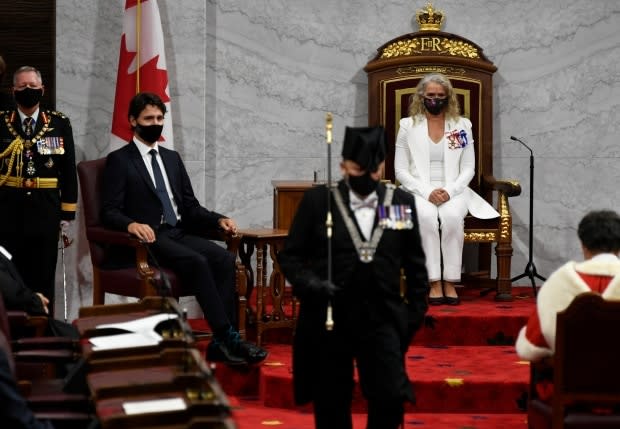Northerners hopeful after throne speech
The premier of the Northwest Territories says she is generally happy with the federal commitments identified in Wednesday's throne speech, though it included only one reference to the North.
The speech was delivered by Governor General Julie Payette and laid out the federal government's intentions for this session of Parliament.
Premier Caroline Cochrane said many of the initiatives outlined in it were identified by herself and her fellow premiers at their Council of the Federation meetings.
"For example, we know that our housing need is huge, that was in the speech from the throne. The need for infrastructure, we need jobs," said Cochrane. "We don't have roads to many of our communities, and climate change was an exciting [issue that was mentioned] as well."
The federal government committed to increase efforts to address the housing shortage in Indigenous and northern communities; shortening up timelines to bring high speed internet to remote communities; ensuring Canadians in rural and remote communities have access to a family doctor; and working with First Nations, Inuit and Métis communities to address food insecurity.
It also committed to speeding up work on the calls to action in the reports of the National Inquiry into Missing and Murdered Indigenous Women and Girls and the Truth and Reconciliation Commission.

Mining key to transition to greener economy
Cochrane said she had hoped to hear something about support for mining exploration in the North. She said she will be lobbying for more support for that in her next meeting with Prime Minister Justin Trudeau.
"I think it's about reinforcing that mining isn't just about taking things from the earth," said the premier. "Mining is an essential part of green energy and addressing climate change."
Though there was no mention of mineral exploration in the speech, the executive director of the Northwest Territories and Nunavut Chamber of Mines said his organization continues to lobby for federal support for it.
"The agenda we're looking at for federal support right now would be strengthening exploration through incentives, perhaps creating a mineral exploration tax credit just for north of 60 that's much stronger than in southern Canada," said Tom Hoefer.
They talked a lot about green energy, clean energy.... That's all well and good but how do you do that up North? - Merven Gruben, Beaufort Delta businessperson
He noted the throne speech did include reference to the importance of mining. Payette said the country has the expertise and the resources that will give it a competitive edge in the transition to a greener economy.
"That was a powerful statement. In fact, it's the North's competitive edge as well," said Hoefer. "So resource development is hopefully something that will be relied on as part of the emerging stronger [strategy]."

CERB being phased out
The federal government said it will be phasing out the Canadian Emergency Response Benefit in the coming months. The benefit, established to help people financially impacted by COVID-19, pays recipients $500 per week for up to six months. Though applicants have to reapply every four weeks, they don't need to provide any proof they qualify for it.
Beaufort Delta businessperson Merven Gruben said he was glad to hear the program is being phased out. He said it has done more harm than good in the North.
He said another way the federal government could help the region's faltering economy is to accelerate its cleanup of contaminated sites in the region.
"There's a lot of people who have overdosed, drank themselves to death," said Gruben, a former mayor of Tuktoyaktuk. "And it's just made people lazy. Not only my company, a lot of companies have had a hard time hiring people."
Gruben also said he was hoping to see support for resource development in his oil and gas-rich Beaufort Delta region.
"They talked a lot about green energy, clean energy," said Gruben. "That's all well and good but how do you do that up North? The closest thing we have to clean energy is the M-18 natural gas well, which we're having a tough time getting going."
The Inuvialuit are exploring the idea of setting up a liqurfied natural gas plant at the gas well near Tuktoyaktuk to fuel Inuvik, Tuk and other communities in the region.
'Thrilled' by promise of universal child care
Aja Mason, director of the Yukon Status of Women Council, said there was a lot in the throne speech that Yukon women could potentially benefit from, but said "the devil's in the details."
"So we want to see what this actually amounts to, and what kinds of considerations are integrated into the actual sort of step-by-step plan," she said.
"Hopefully, it translates into more money for things like housing, for food security, for access to technology and especially justice system reforms."

Mason said the commitment to universal child care was particularly welcome.
"We're thrilled to hear that. I mean, there's an absolute need for that, regardless of [the] pandemic or not," she said.
Mason says the idea has been talked about before, but things are different now.
"The government's being held to a different set of standards now, just by virtue of everything that's going on. I think of what we learned from the first wave of lockdowns is that so much of the responsibility for care was placed disproportionately on the shoulders of women," she said.
Kluane Adamek, Yukon regional chief with the Assembly of First Nations, agrees that child care is a big issue.
"I grew up with a single mom and I know how hard it was for her. And this is about making sure that we're taking care of all kids and that everyone has equitable opportunities," Adamek said.
But she says the throne speech is just a start — and now the government must follow through on all of its commitments.
"What's going to be really important is where we're going to see those investments," she said.


